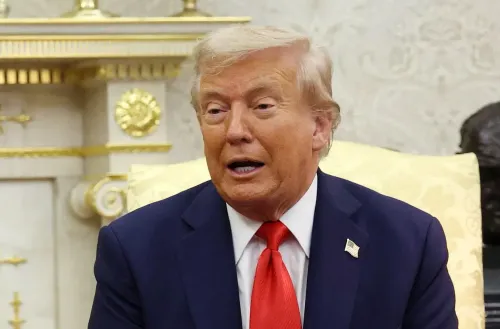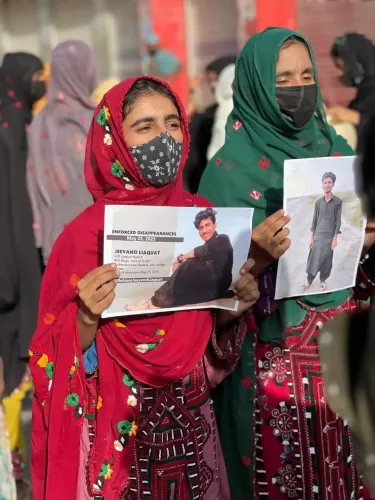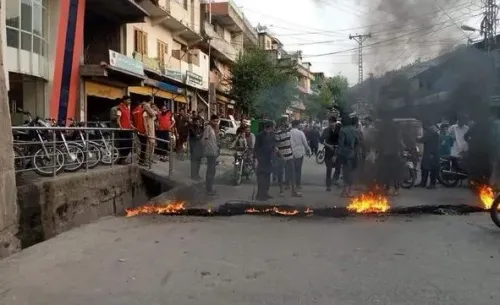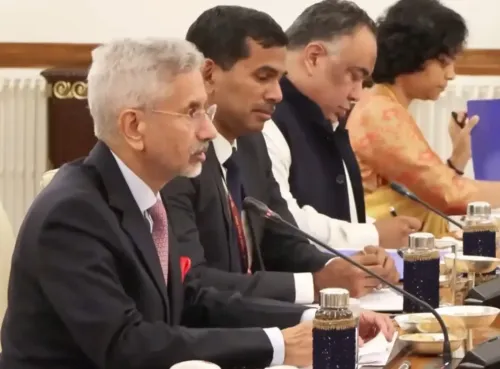Is Gilgit-Baltistan Pakistan's Colony of Silence and Resistance?
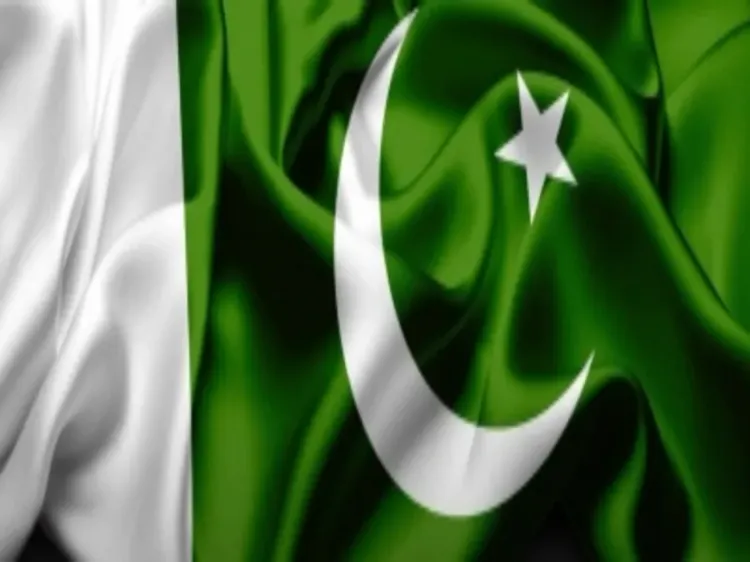
Synopsis
Key Takeaways
- Gilgit-Baltistan is rich in resources but suffers from systemic oppression.
- Recent clashes illustrate the demand for justice from local residents.
- The region's governance relies on coercion rather than legitimacy.
- There is a stark contrast between the development in Jammu and Kashmir and the neglect of Gilgit-Baltistan.
- The international community must recognize and support the struggle of the people in Gilgit-Baltistan.
New Delhi, Aug 31 (NationPress) Gilgit-Baltistan is a region adorned with breathtaking mountains and resilient inhabitants. Regrettably, it has endured the oppression of the Pakistani establishment for many years. The most recent occurrence involves a confrontation in Sost Valley, where the local police assaulted peaceful demonstrators. Traders in Gilgit-Baltistan had resorted to blocking routes in their quest to make their voices heard, only to encounter the harsh response of state authorities.
This incident underscores the reality that Pakistan's governance in Gilgit-Baltistan is maintained not through legitimacy, but through coercion. The plight is not limited to a single valley or protest; it is ingrained in Islamabad’s overarching strategy toward Gilgit-Baltistan. Since the illegal occupation of the region in 1947, the local populace has been systematically silenced and excluded from the nation's constitutional framework.
Moreover, the original inhabitants of Gilgit-Baltistan bear the burden of taxes, oppressive laws, and authoritarian governance. They lack any influence regarding their own administration. Their lands are exploited, their resources extracted, and their youth face military harassment.
The clash in Sost Valley is merely the latest in a series of incidents that have unveiled the darker side of Pakistan's rule. When citizens inquire why they should pay significant taxes without representation, they are met with violence. Villagers who protest against the plundering of their water and forest resources are labeled as troublemakers and traitors.
Students seeking educational opportunities are met with hollow promises and police crackdowns. The pattern is consistent: deny, dismiss, and destroy. Islamabad’s leaders perceive Gilgit-Baltistan not as a partner but as a colony, a subjugated region to be exploited and controlled.
The violence experienced is not solely physical; it is deeply structural. Gilgit-Baltistan possesses immense hydropower potential, capable of supplying electricity to much of Pakistan. However, while cities like Lahore and Karachi receive abundant electricity, many villages in Gilgit-Baltistan languish in darkness, suffering from continuous power shortages.
The minerals extracted from its land, the water drawn from its rivers, and the strategic importance of its location—all serve to enrich Pakistan while leaving the local communities impoverished.
This economic exploitation is accompanied by cultural annihilation. Educational materials glorify Pakistan's narrative while silencing the history and identity of Gilgit-Baltistan. Media is tightly regulated; journalists who dare to report truthfully face harassment, arrest, or worse. Activists often vanish or are charged under stringent anti-terror laws for simply voicing their opinions. What Pakistan presents to the world as governance is, in reality, a system of oppression.
The incident in Sost Valley should come as no surprise to anyone familiar with Pakistan's history in Gilgit-Baltistan. The demonstrators were not demanding luxuries; they were pleading for justice, fair treatment, and recognition of their voices.
Yet, instead of engaging in dialogue, the government resorted to violence. This habitual reliance on force reveals the uncomfortable truth that Pakistan cannot afford to listen, as doing so would expose the injustices at the core of its rule. Acknowledging the grievances of Gilgit-Baltistan would mean admitting the illegitimacy of its decades-long occupation.
It is simpler for Pakistan to continue stifling dissent and hoping the international community remains silent. However, silence cannot last indefinitely. The people of Gilgit-Baltistan have endured too long under oppression, their patience wearing thin due to years of neglect and cruelty. Pakistan claims to champion Muslim solidarity globally, yet it denies Muslims in Gilgit-Baltistan their fundamental rights. It advocates for Kashmir's freedom while denying it to those within its own occupied territory.
The hypocrisy is astounding. Ironically, by repressing Gilgit-Baltistan, Pakistan is not only alienating its people but also planting the seeds of its eventual loss of control.
The scars from the Sost Valley crackdown are not merely physical injuries to those harmed; they represent wounds in the relationship between the people and the state, wounds that deepen with every act of brutality from Pakistan.
Each clash, every suppressed protest, and every silenced voice emphasizes that the Pakistani establishment views Gilgit-Baltistan residents not as citizens but as subjects to be dominated. This fosters resentment that no amount of propaganda can erase. Though the people might be forced into silence for now, their anger continues to simmer beneath the surface, awaiting the moment it can no longer be contained.
In stark contrast, across the Line of Control in Jammu and Kashmir, India is pursuing a developmental vision that, despite its challenges, aims to integrate the region with dignity and progress.
Infrastructure improvements, such as new roads and highways, expanding educational institutions, and enhancing healthcare facilities, are on the rise, creating new opportunities for the youth. Where Pakistan relies on fear and oppression, India invests in schools, universities, hospitals, and industries. Where Pakistan extracts resources from Gilgit-Baltistan, India is enriching Jammu and Kashmir to empower its citizens.
The contrast is glaring: oppression on one side, development on the other. Pakistan's leaders may deride this comparison, yet it is this very disparity that reveals their moral bankruptcy.
The residents of Gilgit-Baltistan are not oblivious. They recognize the transformation occurring in Jammu and Kashmir while remaining ensnared in neglect. They observe that where India is fostering a future, Pakistan is denying them even a present. They ask the pressing question: why must they endure suffering under Pakistan's control when their counterparts across the border are granted opportunities to flourish?
Pakistan's greatest dread is the political awakening of Gilgit-Baltistan. It fears the day when the people fully comprehend the extent of their losses and refuse to accept Islamabad's fallacies any longer. That is why oppression has become its default strategy. Crackdowns like the recent one in Sost Valley reflect not authority, but rather weakness, insecurity, and a government acutely aware that its grip is loosening. A community seeking justice cannot be silenced indefinitely. A populace yearning for dignity cannot be permanently subjugated.
The narrative of Gilgit-Baltistan is one of resilience against betrayal. For decades, despite being overlooked, its people have risen, protested, and demanded what rightfully belongs to them. Each confrontation with security forces, every blockade, and every defiant slogan serves as evidence that Pakistan has failed to extinguish their spirit. The international community must acknowledge this struggle and align with the people, rather than their oppressors. To turn a blind eye is to legitimize Pakistan's colonial enterprise, which thrives on the exploitation of those it pretends to represent.

